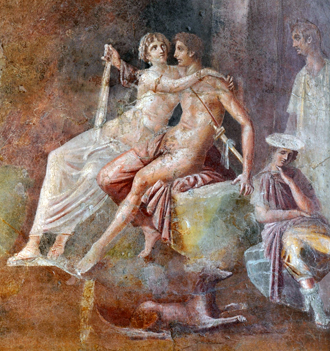Dido Queen of Carthage
Act V Scene i
Location: Dido's Court
This lengthy scene concludes the tragedy, the action following poem whilst also drawing Marlowe's own sub-plot threads to a neat conclusion. It comprises three main pieces of action, but again these are not formally divided into separate scenes since at least one character stays on stage in each case. The first section has Hermes (the Gods' winged messenger, also called Mercury) deliver a stern message from Jove to Aeneas that he must leave for Italy. Next Dido confronts Aeneas about his impending departure. And once the Trojan fleet has sailed, a grief-stricken Dido commits suicide, quickly followed by Iarbus, and then Anna.
Dido:
O no, the Gods wey not what Louers doe,
It is Aeneas calls Aeneas hence
Dido, Queen of Carthage, V.i.131-2
Hermes Delivers Jove's Message in Person
The scene opens with Aeneas discussing his detailed plans with Achates, Cloanthus, Sergestus and Ilioneus for the rebuilding of Carthage city as a new and "statelier Troy" (to be named Anchisaeon in honour of his father). Soon though the Gods' winged messenger Hermes (Mercury) arrives with an "angry message" from Jupiter. Why is Aeneas rebuilding Carthage "and beautifying the Empire of this Queene" [V.i.28], when he should be sailing to Italy to fulfil Jove's mission?
Hermes has brought Ascanius with him too, having rescued him from the Idalian groves in Cyprus ("Ida") where Venus had planned to hide him at the end of scene III.2. Aeneas immediately deduces that Venus must have substituted his brother Cupid for Ascanius, which is perhaps a rather bold leap of logic. But this realisation is significant for the plot, and thus perhaps a dramatic economy we can forgive Marlowe. It is now clear to Aeneas what has happened: "No maruell Dido though thou be in loue, that dayli dan[d]lest Cupid in thy armes" [V.i.44-5]. That Dido has not fallen 'naturally' in love with Aeneas gives him the extra justification he needs to finally leave her.
When Aeneas asks his son where he has been, Ascanius replies that he has been "eating sweete Comfites with Queene Didos maide, who euer since hath luld me in her armes" [V.i.47-8]. This surely is a mistake: it was Cupid disguised as Ascanius who was offered all kinds of comfits by Dido's nurse in the previous scene, whilst the real Ascanius was hidden alone in the groves by Venus.
Aeneas Determines to Depart Once More for Italy
Aeneas instructs Sergestus to take his son to the Trojan ships for safe keeping "lest Dido spying him keepe him for a pledge" [V.i.50], and thus Aeneas seems once more determined to leave. He ponders how he might depart when they "haue no sailes nor tackling for my ships?" [V.i.56].
This is again perhaps a dramatic convenience on Marlowe's part. It might just be feasible that Aeneas should somehow already know that Dido has taken "away my oares and masts, and left me neither saile nor sterne abourd" [V.i.60-1], but is it perhaps a little unrealistic that he should carry on happily planning to rebuild Carthage if he were aware of Dido's act of mistrust? The practical problem is anyhow solved when Iarbus now chances upon the downcast Trojans, and is of course only too happy to "furnish thee with such supplies" [V.i.72] as will help Dido's love leave.

Dido Confronts Aeneas
Dido now enters to confront Aeneas. She has seen Ascanius led towards the ships by Achates, which she also knows are "new rig[ge]d". Not only is this inconsistent with Aeneas leaving his son in Sergestus' charge, it is also once again an unrealistic timeline. If Aeneas had exited the stage (as some Editors amend) after Iarbus had set off to fetch the rigging etc, we would be able to imagine that sufficient time had passed to ready the ships. But as Aeneas stays on stage, we must rather suspend disbelief to imagine the ships now ready to set sail for Italy.
Unlike the dissembling that followed his previous failed attempt to flee, Aeneas is now confident enough to plainly tell Dido the reason for his departure: "I am commaunded by immortall Iove, to leaue this towne and passe to Italy" [V.i.99-100]. There follows some of the best poetry in the play, albeit translated from Virgil, as Dido desperately implores the Trojan to stay whilst Aeneas can only claim helplessness in the face of the "Gods behest". In keeping with Marlowe's general focus on the eponymous Queen in adapting his source, Dido's speeches remain lengthy whilst Aeneas' responses in which he defends his actions are abridged to a few concise lines each time.
Marlowe even retains some original Latin lines from the Aeneid [V.i.136-140, and indeed towards the end of the scene at V.i.310-3]. Some critics (Boas and Ellis-Fermor) put this down to the poet's limitations, whilst others (Oliver) credit Marlowe rather with appreciating the beauty of Virgil's lines and the recognition that they could not be matched in translation. Others ascribe the inclusion of Latin lines to the target actors, namely Cambridge students (see discussions on dating the play).
Aeneas Leaves and Dido is Distraught
As in Virgil, their parting is emotional and dramatic. "If not, turne from me, and Ile turne from thee: for though thou hast the heart to say farewell, I haue not the power to stay thee" [V.i.181-3]. She turns, and Aeneas leaves silently.
Turning back, the Queen cannot believe Aeneas has left for good. She imagines him getting as far as his ship before "he shrinkes back, and now remembring me, returns amaine: welcome, welcome my loue!" [V.i.190-1]. Anna enters and struggles to console her sister in her grief. Dido dispatches Anna to the port-side to beg Aeneas to stay, but unlike last time this desperate mission fails: "Aeneas was abourd, and spying me, hoyst up the sailes amaine" [V.i.226-7].
The final straw is the nurse reporting the disappearance of Ascanius, which Dido already knows (although not realising the Cupid substitution). The Queen's wrath is directed at the innocent nurse, as she first insults her: "O cursed hagge and false dissembling wretch, that slayest me with thy harsh and hellish tale!" [V.i.216-7] and then accuses her of treason and has her thrown in prison.

Dido Commits Suicide, Followed by Iarbus and Anna
Dido desperately craves some means of following her lover, with "wings of waxe like Icarus" [V.i.243], or riding on a dolphin's back. But eventually she accepts the painful truth, and determines that there is only one course of action: "I must be the murderer of my selfe" [V.i.270]. But she cannot tell her sister this, and so feigns a plan to burn Aeneas' possessions that he has left behind, "to rid me from these thoughts of Lunacie" [V.i.273].
Iarbus arrives to find Dido in resigned mood. Wood is brought and they build a fire, before she asks to be left alone. Increasingly depressed, she burns first Aeneas' sword "that in the darksome Caue he drew, and swore by to be true to me" [V.i.295-6], then the clothes she first lent him when he came ashore, and finally his letters. After praying that the Gods ensure the "traytors ... be still tormented with vnrest" [V.i.304-5], Dido commits suicide by throwing herself onto the burning pyre whilst quoting directly in Latin a line from the Aeneid that translates roughly as "I rejoice at passing into the darkness" [V.i.313].
Marlowe adds his own twist to this traditional tragic ending. Anna and Iarbus rush in to find Dido "in these flames". Distraught at the suicide of his beloved Queen, Iarbus also kills himself with the line "Dido, I come to thee: aye me, Aeneas!" [V.i.318]. In turn, Anna is grief-stricken at the loss of her "sole delight" [V.i.321] and she too kills herself: "Now sweet Iarbus stay, I come to thee" [V.i.328] and we are left suddenly with a body count that has been frequently criticised by commentators as undermining the tragic nature of the play.